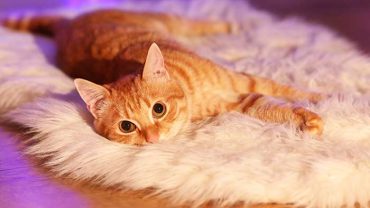It’s almost impossible to imagine a night without a light. Crashing into the wall, knocking over furniture, slipping and falling on the wet floor, there are not enough accidents that can happen on a dark night without a light.
And if you own a cat, you may accidentally trample over it, thereby injuring your furry, little friend.
Whichever way we look at it, a dark night without a source of light is never an ideal situation. However, can the same be said about our feline companions? Do cats need a night light?
The answer is a resounding NO. Domestic cats, like all other animals of the feline family, do not need light to see at night.
But that doesn’t mean you shouldn’t have provisions for light at night either.
As humans, we need to know where our cats are sleeping so as to avoid treading over them at night. And that especially applies to owners of elderly cats or young kittens who are often highly vulnerable.
So, it’s reasonable to conclude that while cats don’t need light to see at night, their human parents require light to help them navigate through the darkness.
In essence, you must have light at night if you are a pet owner, particularly if you live with smaller pets, such as cats.
Table of Contents
How Well Do Cats See At Night?
Many of us have often wondered, does my cat need a light at Night to see?
The best way to address that question is to examine whether cats can see in total darkness. From time immemorial, we’ve always believed that cats can see in pitch black, apparently, due to their incredible ability to track down mice even in total darkness.

However, experts observe that much as cats have a near-excellent vision at night, it’s quite difficult to quantify that vision. But we can compare feline vision to human vision and possibly determine how well cats can see at night.
According to various research, cats can capture up to 50% more light than humans. A vision that’s 50% better than ours is quite remarkable, but it doesn’t mean that cats can see in total darkness. A cat’s ability to see better than humans at night all comes down to its genetics.
The following are some of the physical features that enable a cat to see better than us in muted light.
1. Eyes That Are Disproportionately Large Relative to Their Head Size
One of the characteristics of the domestic cat that makes it able to see better in muted light is its enlarged eyes.
You may not have noticed how big your cat’s eyes are compared to the size of its head. That’s because in broad daylight characterized by bright light, the cat’s pupils tend to narrow tightly.
To help you uncover that disproportionality, you would need to examine your cat more closely, especially in dim light. You’ll easily notice that those eyes are pretty big for that head.
2. Flexible Irises
A cat’s irises can open very wide, which is another plus in terms of enhancing their vision at night.
Due to their flexibility, a cat’s irises can absorb maximum amount of light in dim conditions and process that light much faster than humans can.
Flexible irises also mean that cats have a broader field of vision, and can see up to 200 degrees of their surroundings, compared to 180 degrees for humans.
3. Higher Rod Count
A cat’s retinas are highly sensitive to light. Their retinas comprise two primary cell types, namely, Cones and Rods.
The rods are highly efficient at reflecting light, helping the cat to accurately make out the objects around it even in dim light. While humans also have rods, cats have up to 4 times the number of rods that we have.
Overall, a cat’s vision at night is only second to none. In fact, cats have such a great vision that in medieval Japan, people could tell the time by observing the shape of a cat’s pupils.
However, it’s important to note that while cats can see better than us at night, they don’t outperform us in all aspects of vision.
For instance, cats have less acuity, which means objects to them appear more blurry unless they’re really close by. And that also applies to their color perception. Images reflect on a cat’s eyes as unsaturated and washed out, with fewer red hues.
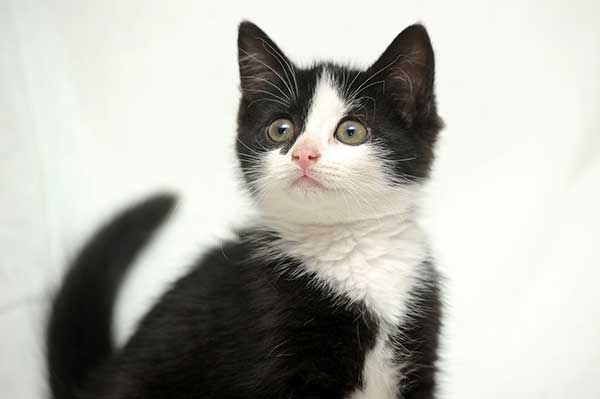
But like we’ve mentioned, they have many redeeming genetic features that make their vision in darkness outstanding.
Cats also complement their rather diminished visual acuity with their sensitive sense of hearing. A cat can pick up even the faintest sounds of a mouse racing in the attic.
The whiskers also play a significant role in helping your feline friend navigate through the darkness. A cat’s whiskers can help it to detect the presence of objects on its way, which explains why blind cats tend to find their way around the house with much ease.
? Lastly, cats have a profound sense of smell. Even in darkness, your cat should have no problems finding its food, water bowl, or the litter box.
Are Cats Nocturnal?
One of the popularly-held misperceptions about cats is that they’re nocturnal creatures. However, cats are crepuscular. But what do these terms imply?
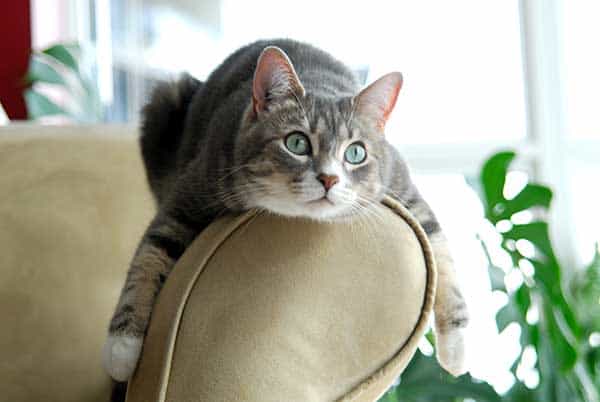
1. Diurnal Animals
These are animals that are active during the day. Diurnal animals are also known as day shift animals.
Most diurnal animals have colored and acute visions. Examples include humans and most primates, dogs, elephants, most insects, deer, elephants, and most birds.
Diurnal animals mostly rely on daylight for better visibility in spotting prey or predators. They also benefit from direct sun exposure, which is instrumental in the synthesis of vitamin D3.
2. Nocturnal Animals
Also known as night shift animals, these are animals that are more active at night. Some animals, such as mice, are adapted for nighttime activity as it allows them to avoid fierce predators.
On the other hand, nocturnal predators, such as owls, prefer to hunt at night as it gives them the element of surprise over their prey.
Overall, nocturnal animals are gifted with excellent infrared vision as well as heightened senses of smell and hearing.
3. Crepuscular Animals
Like domestic cats, crepuscular animals are more active during twilight (at dawn and dusk).
Crepuscular prey, such as rabbits, prefer to be active at twilight because they believe fewer predators are on the prowl then. At the same time, they also have some light to get by.
You’ll discover that most crepuscular predators are smaller animals, like our domestic cat. Hunting at this time gives them more leverage as there is reduced competition for prey since most larger predators are not active.
Besides, many of the cat’s preys, such as mice and rats, also happen to be active during this time.
Crepuscular animals can be further subdivided into the following categories;
- Matutinal Animals – Animals that are strictly active at dawn, such as bees.
- Vespertine Animals – Animals that are most active at dusk.
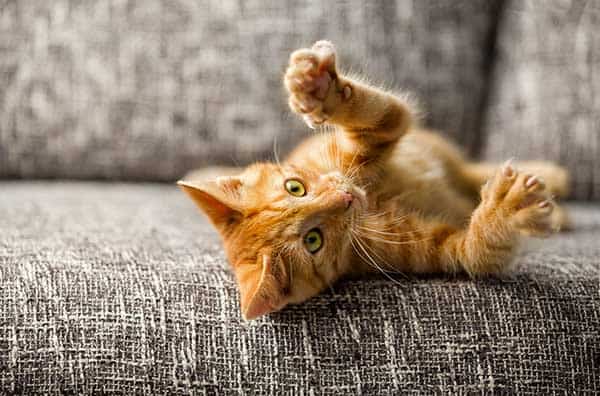
Both nocturnal and crepuscular predators prefer activity under cover of darkness as it reduces competition for food. As for the prey, it makes them less vulnerable to the many diurnal predators out there.
You should also remember that some animals are both diurnal and nocturnal. For instance, while the domestic cat was designed to be strictly crepuscular, years of living with their human owners have seen most of them also become active during the day.
So, unless your cat is interrupted by anything, such as the sound of a mouse, a strange smell, or the urge to use the litter box, it will likely rest throughout the night.
Reasons to Consider Leaving Lights On At Night
Given that cats are crepuscular and will do just fine in darkness, you might be wondering whether you should still leave some lights on at night.
As we mentioned at the beginning, leaving some lights on at night is a perfect idea, especially for cat-owning families.
Older cats are known to get anxious and distressed more easily. For such cats, sleeping under complete darkness may not be a great idea. So, you may have wondered to yourself, do older cats need night lights?
Yes, one of the ways to make them feel at ease is to leave some dim lights on around their sleeping area.
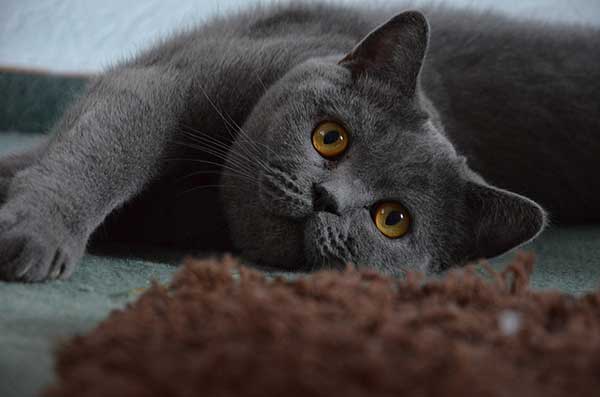
What of kittens, should I leave a light on for my kitten at night?
Like older cats, kittens also tend to get nervous, particularly when they’re in new surroundings. So, do kittens need light at night?
Yes, kittens require light at night, especially if they’re still struggling to adjust to their new environment.
Lastly, leaving some light on at night is for your own good. The light will enable you to see your cat and avoid tripping over it, or any other objects in your path.
? So, the conventional wisdom is to go to sleep with some lights on, whether you’re living with a very old, very young, or sickly cat. Remember that even cats that are medically sound often get lonely at night.
A period of eight hours of total silence in darkness will likely pique the anxiety of your feline friend. Their attention-seeking behavior might get the better of them, causing them to start bugging you. And it can get worse if you’re always gone, and the cat has somewhat developed separation anxiety.

Thankfully, there are many expert tips you can implement to ensure your feline friend gets a good night’s sleep.
Examples include;
1. Provide the cat with adequate physical and mental stimulation during the day. That’s an excellent way to tire down your cat and cause it to rest the night away.
Even if you’re always away most of the day, ensure you supply your cat with enough toys so that it can remain active throughout the day.
One special recommendation here is the Dezi & Roo Wiggly Ball Grow-in-the-Dark. These bouncy, wiggly balls come in a set of three and glow in the dark, mimicking the motions of real prey.
As the balls bounce and roll like prey, your cat will be chasing and biting them, which is a great way to help the cat release its pent-up energy.
The balls are designed and recommended by feline veterinarians, so you can vouch for their safety. And the inclusion of a 7” tail makes them all the more realistic.

2. Have a robust feeding schedule where you ensure the cat has easy access to its food and water. That will prevent roaming and prowling around the house.
3. Research proves that cats that eat turkey-containing foods are likely to have better sleep. Turkey contains essential amino acids, such as tryptophan, which come with sedating effects and can induce sleep.
4. Ignore the cat. Some cats are extremely attention-seeking, and will always put up a fuss when you go to sleep.
Avoid entertaining your cat during bedtime. Similarly, don’t yell or hit the cat. If the behavior persists, you can consider crating the cat until it understands that bedtime isn’t playtime.
5. And to avert emotional loneliness, ensure the cat can access your bedroom throughout the night.
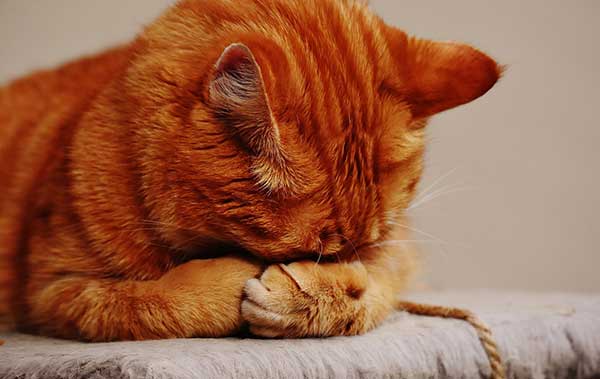
How Much Light Does A Cat Need?
Having mentioned that cats can see remarkably better than us but not in pitch black, you’re probably wondering how much light you should leave on at night.
There’s really no hard and fast rule on this, as it depends on other factors, such as the age and medical condition of the cat.
However, a healthy adult cat will only need residual light to maneuver in the dark. On moonlit or starry nights, you may consider using lighter blinds or curtain shears on your windows. The amount of light coming in will be sufficient for your feline friend to navigate through the night.
Other cats can even make do with most residual lights coming from the electrical appliances in the house, such as the indicator on a power strip.
What Are The Best Lighting Options For A Cat-owning Family?
If possible, always insist on motion-activated lights. Motion-activated lights only come on when your cat moves and go off when there’s no perceivable movement in the house.
Therefore, you won’t have to worry about high monthly energy bills. It’s even better if the lights use LED bulbs and the lamps are designed with programmable timers.
And besides minding about your energy bills, you should also consider the cat’s safety. Tall floor lamps, as well as lamps with halogen bulbs may be potentially-hazardous for the cat. You also want to avoid delicate lamps.
So, Do Cats Need Light At Night?
Cats don’t need light at night, unless they’re very old, young, or sick. However, always leave just enough light on to make the cat feel calm and relaxed.
Also, these lights will prevent you from trampling over the cat or smashing into objects as you move through the darkness.
Needless to mention, go for energy-saving and pet-safe lighting options.

